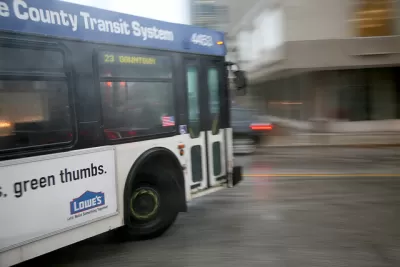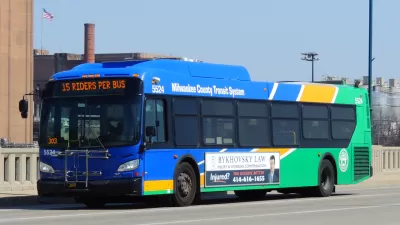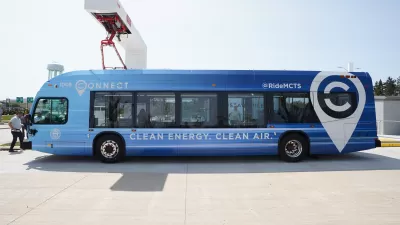Funding for two routes is running out soon, but many workers depend on this service to access jobs outside of the city.

Bruce Murphy writes about the latest on two Milwaukee bus lines, known as the “Job Lines," that connect workers in the city to jobs in outlying suburbs and exurbs. The routes were created in 2014 with the $13.5 million settlement of a lawsuit alleging that planning for the Zoo Interchange expressway did not consider the travel needs of residents from Milwaukee’s low-income and minority communities.
“But the money would cover just four years and is running out at the end of December. So those two bus lines, Route 6 and Route 61, are about to be discontinued. And now no one seems to have a solution to the issue,” says Murphy.
The UW-Milwaukee Center for Economic Development has released a new study showing that the majority of riders on these routes are African American and from the lowest-income parts of the city. Most are also transit-dependent riders traveling to jobs along the routes.
Still, Milwaukee County Transit System officials say that the routes are not cost effective enough to continue and that Route 61 can be replaced with an extension of another line. Murphy also notes that Route 61 extends into two adjacent counties that do not help fund the line, and the three counties have not worked together to try to keep it running.
Murphy also says that companies on along those routes need workers, but they are unlikely to advocate for the bus lines or work to provide private transportation to their employees. “At a time of very low unemployment, the biggest losers may actually be the employers. But long-term the separation between workers and companies in the metro area will continue to retard economic development and stall progress in the Milwaukee region,” says Murphy.
FULL STORY: Black Workers Losing Transit to Jobs?

Study: Maui’s Plan to Convert Vacation Rentals to Long-Term Housing Could Cause Nearly $1 Billion Economic Loss
The plan would reduce visitor accommodation by 25,% resulting in 1,900 jobs lost.

Alabama: Trump Terminates Settlements for Black Communities Harmed By Raw Sewage
Trump deemed the landmark civil rights agreement “illegal DEI and environmental justice policy.”

North Texas Transit Leaders Tout Benefits of TOD for Growing Region
At a summit focused on transit-oriented development, policymakers discussed how North Texas’ expanded light rail system can serve as a tool for economic growth.

Comment: EPA Cuts will Send Atlanta Back to Eye-burning Ozone, Lung-damaging Smog, and Raw Sewage in the Chattahoochee River
A veteran political journalist takes stock of the hard-earned ground Georgia stands to lose with slashed environmental protection.

How Community Science Connects People, Parks, and Biodiversity
Community science engages people of all backgrounds in documenting local biodiversity, strengthening connections to nature, and contributing to global efforts like the City Nature Challenge to build a more inclusive and resilient future.

Alabama: Trump Terminates Settlements for Black Communities Harmed By Raw Sewage
Trump deemed the landmark civil rights agreement “illegal DEI and environmental justice policy.”
Urban Design for Planners 1: Software Tools
This six-course series explores essential urban design concepts using open source software and equips planners with the tools they need to participate fully in the urban design process.
Planning for Universal Design
Learn the tools for implementing Universal Design in planning regulations.
City of Santa Clarita
Ascent Environmental
Institute for Housing and Urban Development Studies (IHS)
City of Grandview
Harvard GSD Executive Education
Toledo-Lucas County Plan Commissions
Salt Lake City
NYU Wagner Graduate School of Public Service




























